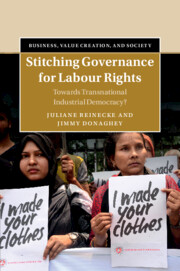7 results
6 - The Rana Plaza Disaster and Its Aftermath
-
- Book:
- Out of Poverty
- Published online:
- 02 January 2025
- Print publication:
- 09 January 2025, pp 89-104
-
- Chapter
- Export citation
1 - Introduction
-
- Book:
- Stitching Governance for Labour Rights
- Published online:
- 09 March 2023
- Print publication:
- 16 March 2023, pp 1-21
-
- Chapter
- Export citation

Stitching Governance for Labour Rights
- Towards Transnational Industrial Democracy?
-
- Published online:
- 09 March 2023
- Print publication:
- 16 March 2023
14 - Industry-Specific Issues and Challenges
- from Part V - Selected Industries and Emerging Discussions
-
- Book:
- Business and Human Rights
- Published online:
- 05 March 2022
- Print publication:
- 24 March 2022, pp 317-347
-
- Chapter
- Export citation
19 - The Use of International Arbitration Tribunals for Business and Human Rights Disputes
-
-
- Book:
- The Cambridge Companion to Business and Human Rights Law
- Published online:
- 10 September 2021
- Print publication:
- 09 September 2021, pp 428-454
-
- Chapter
- Export citation
2 - Children’s Rights in Supply Chains
- from Part II - Case Illustrations: A Brief Introduction
-
- Book:
- Children's Rights and Business
- Published online:
- 23 January 2020
- Print publication:
- 13 February 2020, pp 129-187
-
- Chapter
- Export citation
Beyond Rana Plaza: Next Steps for the Global Garment Industry and Bangladeshi Manufacturers
-
- Journal:
- Business and Human Rights Journal / Volume 1 / Issue 1 / January 2016
- Published online by Cambridge University Press:
- 13 November 2015, pp. 145-151
-
- Article
-
- You have access
- HTML
- Export citation

